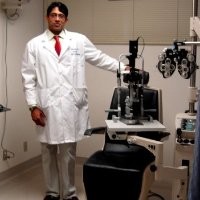In a recent gathering of sustainability experts at the American Society of Retina Specialists 2024 Annual Meeting, a panel comprised of three speakers and two expert consultants from EURETINA explored the environmental implications of retinal procedures and the carbon footprint of professional meetings. They proposed ways that retina specialists can contribute to environmental sustainability.
The panel opened with Dr. Jacob Grodsky, who highlighted the environmental consequences of Intravitreal Injections (IVIs), a common retinal procedure. Citing data from a comprehensive literature review, Dr. Grodsky shed light on the substantial carbon emissions and waste generated by each IVI – 14 kg of CO2 emissions and 190g of medical waste. This translates to an alarming 210 million kg of CO2 emissions and 2.85 million kg of landfill waste in the United States every year, primarily due to patient transportation and procurement processes.
The review underscored the immense opportunity for retina specialists to play a pivotal role in environmental conservation. The growing aging population and advancements in therapeutics will only increase the number of injections performed. As a solution, Dr. Grodsky advocates for the development of durable treatments, sustained-release devices, and gene therapy that would reduce frequent patient visits, thus lowering the environmental impact.
Dr. David Anderson, the second speaker, examined the use and non-use of gloves in IVI procedures. His team carried out a retrospective survey of 19 retina specialists’ practices in 2023. The survey’s results showed that the endophthalmitis rate (a severe eye infection) was statistically similar for both glove and non-glove procedures. However, glove usage causes an estimated 2000 tons of CO2 emissions annually, equivalent to running a car engine non-stop for five years.
Dr. Scott McClintic discussed the carbon footprint of the ASRS Annual Meetings from 2013 to 2017, highlighting air travel as a significant contributor to carbon emissions. Through a localization optimization algorithm, Dr. McClintic proposed that relocating the meetings to the US Northeast or Midwest could reduce emissions by up to 29%.
In the ensuing panel discussion, Drs. Jens Kiilgaard and Martin Zinkernagel from EURETINA shared the sustainability measures being implemented by European retina specialists. They agreed that reducing waste and travel is challenging, but noted the importance of discussing these issues with industry leaders and politicians. They also emphasized the need to raise awareness about waste and sustainability measures, reminding the audience that our current actions will impact future generations.
In conclusion, the expert panel at the ASRS 2024 Annual Meeting provided valuable insights on how retina specialists can play a significant role in environmental sustainability. It’s clear that every decision made in the medical field, from the use of gloves to the location of meetings, can have an extensive environmental impact. Therefore, it is incumbent upon us to implement sustainable practices across all facets of our work.


Comments are closed for this post.